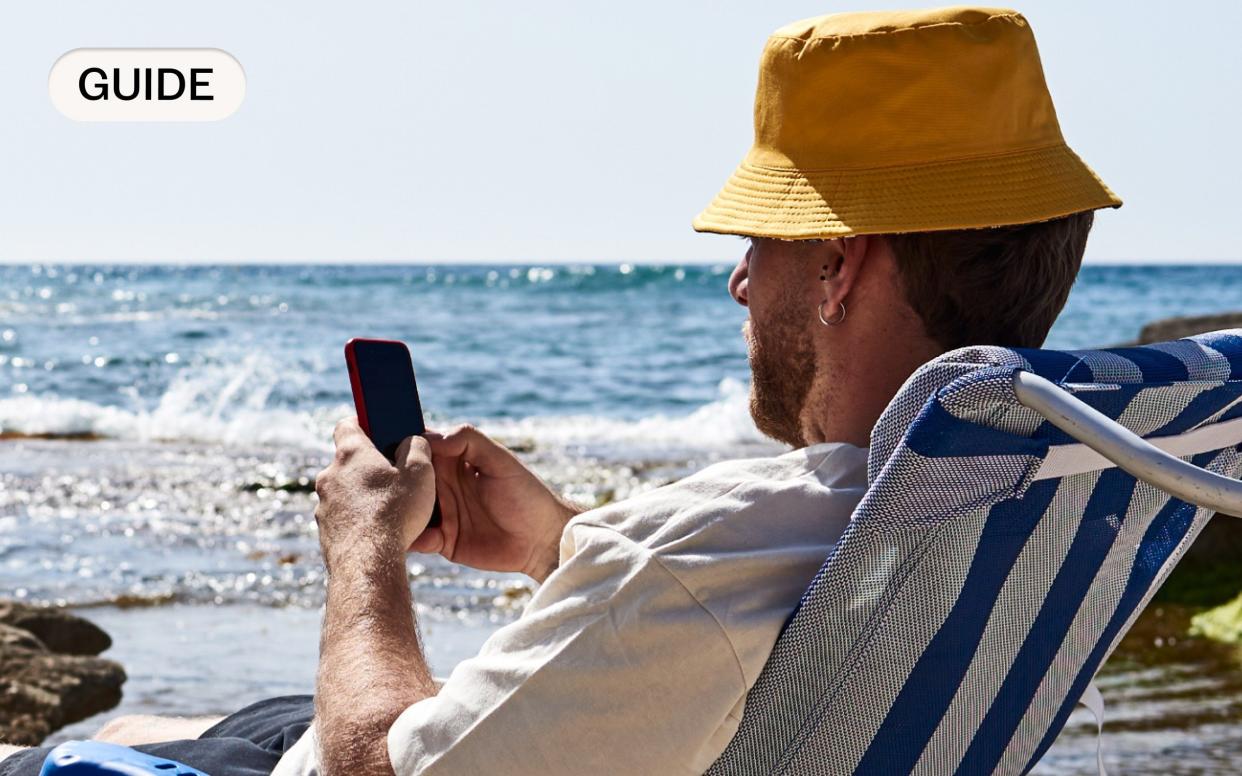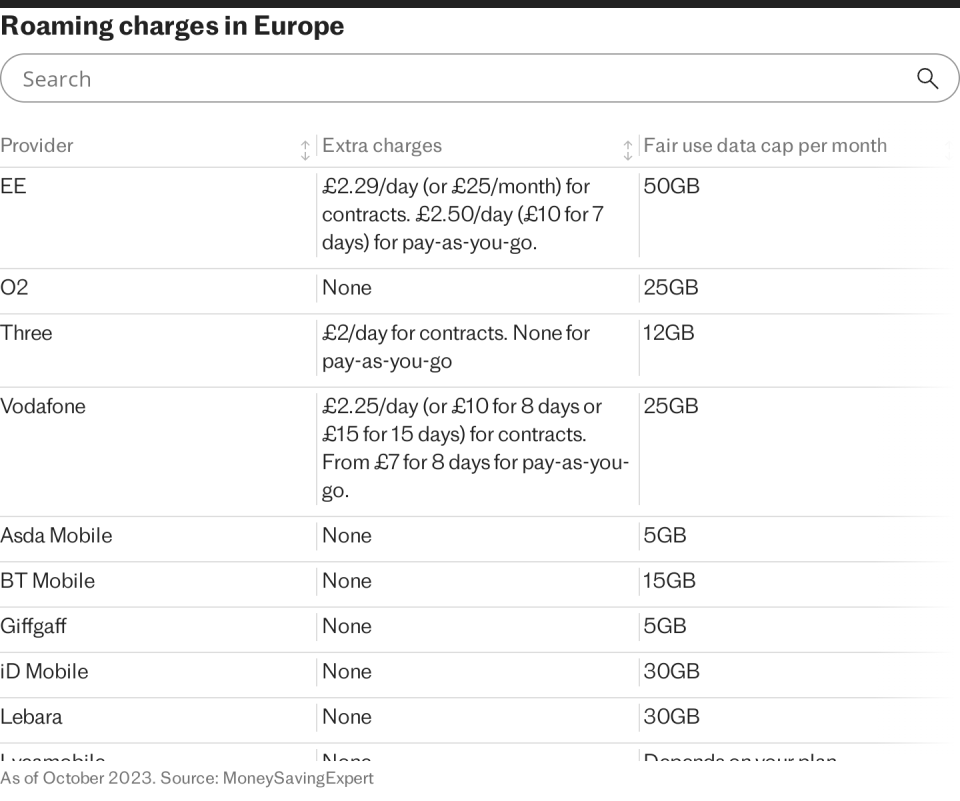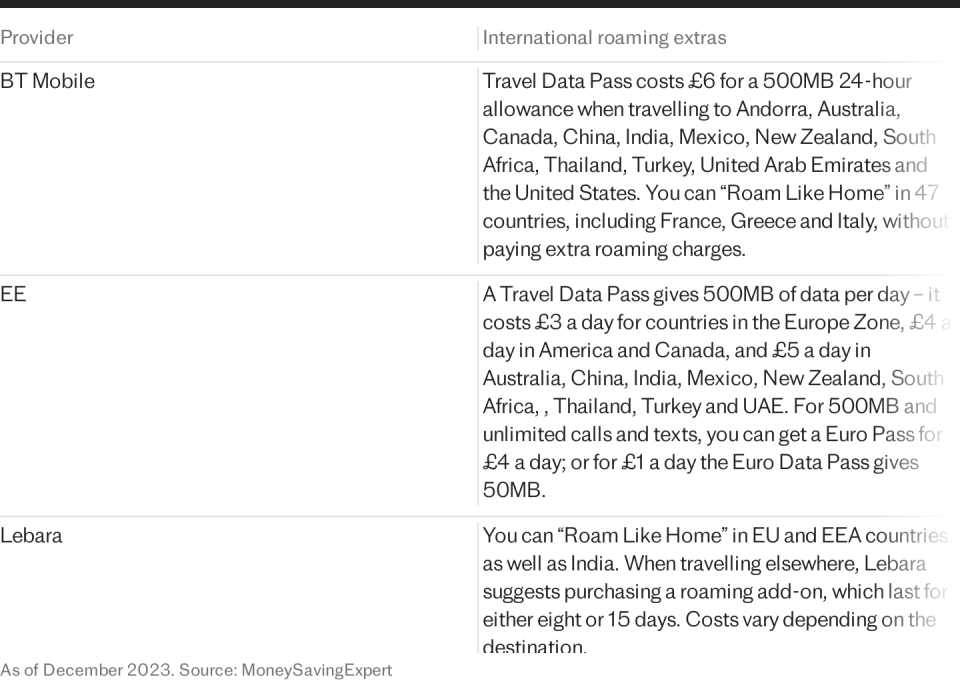Using your iPad or phone abroad? Here’s how to avoid a massive roaming bill

If you are heading to the French slopes for a week’s skiing or the Tunisian coast to soak up the winter sun, the last thing you’ll want on returning home is a mammoth mobile phone bill.
Yet this is the frustrating reality for travellers who get stung by confusing rules and weird traps when using mobile data abroad.
When Britain was still in the EU, you could roam using your existing call, text and data allowances at no extra cost within the bloc.
But, post-Brexit, many providers have reintroduced pricey roaming charges.
And if you’re travelling outside Europe, it can seem like a wild west of terms and conditions are there to catch you out if you are not careful.
Here, Telegraph Money explains how to avoid paying through the nose for data abroad.
How much does roaming cost in Europe?
“Roaming” happens when your phone or tablet connects to a mobile network in another country.
Three of the “big four” mobile network providers – EE, Three, and Vodafone – now charge to roam in Europe.
UK Vodafone contract customers travelling elsewhere in Europe pay £2.25 a day, £10 for eight days or £15 for 15 days, depending on the bundle you choose.
Three charges a flat £2 a day, while EE contract customers pay £2.29 a day, or £15 a month, to use existing data and call plans as if they were at home.
The fourth of the “big four”, O2, currently includes roaming in Europe (known as its “Europe Zone”) as part of its tariffs, so your data, minutes and text allowances work as they would in Britain.
Some smaller providers have retained free roaming costs within the EU, plus Iceland, Liechtenstein and Norway.
Can I cap my spending?
The amount of mobile phone data you can use in Europe may be limited by your service provider’s fair use data cap. Most mobile providers cap daily spending by default.
Your network should alert you when you’re at 80pc data usage, and again at 100pc.

But to be safe, you can set your own daily spending cap via your network’s website or app, though it can be simpler to call up and ask this to be instated.
What about travelling outside Europe?
Data costs can vary dramatically between different networks if you venture beyond Europe, so make sure you check the terms of your agreement.
For instance, using data when roaming in America varied from 20p per MB with Giffgaff to £6 per MB on a Three contract, according to analysis by Which?. Some providers charge an eye-watering £7 per megabyte of data and nearly £4 a minute to make or receive a call.
If you are planning a far-flung trip, a pay-as-you-go Sim from Three comes out on top, according to analysis by MoneySavingExpert.
You can pick up a Three pay-as-you-go Sim that lets you make calls and texts back home or to other UK numbers, and use data in 71 destinations – 41 additional locations outside Europe – including Australia and the US.
It costs around £10 per 10GB of data.

While the price and range of destinations is highly competitive, there are several drawbacks. You will need an unlocked phone to use the Sim, have to use a new number, use the Sim in the UK at least once before you travel abroad, and use it once every six months to keep it active.
Common roaming traps to avoid
When it comes to using your phone or mobile data abroad, there are lots of quirks to the system that can commonly catch people out. Here are some of the most common issues, and how to avoid them.
Cruises can cost you
Travellers embarking on cruises have been stung for thousands of pounds because they did not buy a roaming bundle suited to a whistlestop world tour.
As you move across borders and through international waters, your phone or tablet risks connecting to the maritime network, rather than the typical satellites it would connect to while on land.
Your phone will go into roaming mode, meaning phone calls, text messages and data will be charged at a premium rate – which could land you with an unexpectedly large bill.
It is also easy to accidentally connect to the network of a neighbouring country, which may come with much higher charges – especially if you are moving from inside to outside Europe.
If your roaming is left on you could be charged extra even if you are not using your device, as apps can still be running in the background without you realising.
Avoid voicemail
Outrageously, if you are travelling outside Europe, you can be charged for someone simply leaving you a voicemail, even if you do not pick up the message.
With EE, for instance, it can cost as much as £3.11/min to receive a voicemail, and a further £3.11/min to listen to it.
If you’re not sure how much this service will cost you, check your network charges before you leave Britain. If the cost is steep, or you are unsure how much you might be charged, the best bet is to turn off your voicemail function altogether.
Watch what the kids are up to
In the frantic lead up to a family holiday, it is easy to forget about the children’s devices.
Scotland’s Health Secretary Michael Matheson ran up an gargantuan £11,000 data roaming bill while on holiday in Morocco last Christmas because his parliament-issued tablet had not been switched to a new data provider.
The bill sparked a political scandal, and Mr Matheson said he would pay the charge himself when the expense became public, after initially billing the taxpayer.
He later said that his sons had used the iPad’s data to stream football matches.
Recommended
Terrible internet? Here’s how to get the broadband speed you were promised
How else can I side-step charges?
Stick to WiFi
It won’t count as roaming when you’re connected to Wi-Fi networks, and you can often find it for free in hotels and restaurants.
As well as using the internet, you can also use Wi-Fi to make calls via free apps like WhatsApp, Facebook Messenger and Skype.
However, beware that some organisations charge you for using Wi-Fi – though you will generally be alerted beforehand if they do.
It’s also important to check whether the Wi-Fi network is legitimate, as it can be a way for scammers to access your personal data.
Download before you go
Downloading TV programmes, films, and music can quickly erode your data allowance. One film can easily use up over 1GB of data, and could mean you surpass your provider’s fair use cap.
To avoid this, make sure you make any large downloads before you go on your holiday, ideally on your home Wi-Fi network.
Apps such as Netflix and Spotify allow you to download content and watch or listen to it later – even if your phone is on aeroplane mode – allowing you to avoid using the data while abroad.
Buy an e-Sim
An eSim (or embedded Sim) is a digital version of the physical Sim card that goes in your phone or tablet. Almost all of the latest iPhone, Google or Samsung smartphones are compatible with an eSim.
While abroad, eSims work as if you were a local, which can be a lot cheaper than using your home network and buying roaming add-ons. You can buy and load an eSim plan on to your phone before you leave the UK.
One drawback is that international eSims usually only offer data packages, not calls or texts – but, as mentioned previously, you can still send messages and make phone calls via apps that use data.
Airalo, as an example, offers eSims for more than 200 countries. Its service in Turkey for 5GB of data costs £9.50 and lasts for 30 days, compared to up to £8 a day that some providers charge for non-EU roaming charges.
Get a local Sim card
If you are embarking on a longer trip, or plan to return to the same country multiple times a year, it might be worth getting a local Sim card. It will allow you to make calls, send texts and use data just like you would at home, but avoid paying any roaming fees.
As in Britain, you can either get a prepaid Sim card, or sign up to a rolling monthly deal.
You can buy a prepaid Sim card when you arrive in the country, which includes a local phone number and a bundle of calls, texts and data that you can top up as often as needed.
These are often available from airports, or mobile phone stores and newsagents in the country you are travelling to.
It is worth remembering that this means you will get a new number, and will have to import your contacts across to your new Sim.
Buying the Sim and getting it set up will involve a small amount of faff, but the longer you plan to stay in the country, the more practical this option will be.
Recommended
‘I think my energy direct debit is too high – what can I do?’


